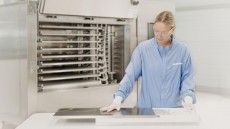Cautious biotech investors stifle R&D
raised by the annual biotechnology report from Marks &
Clerk.
The report is based upon the responses of 484 people with an interest in the biotech industry, which highlight concerning trends for the sector.
It appears that conditions within the industry are making investors increasingly cautious, leading to a reduction in the R&D budgets of biotech companies.
Dr Gareth Williams, co-author of the report, comments: " Biotechnology represents the future of modern medicine, where yesterday's innovators now struggle with dwindling pipelines, generic competition and a chequered R&D record. "
Whilst the long-term view has not changed, we are seeing a short to mid-term funding gap in the current climate, which poses a genuine risk to essential, early-stage research and development ."
A particular area of concern is the increasingly cautious attitude being displayed by regulatory bodies, with 72 per cent of respondents believing it is essential the process becomes less risk adverse.
The perceived difficulty in the approval process has a knock on effect of eating into a drugs time under patent, reducing the lifespan of a product.
This was a concern for 91 per cent of the respondents, with 78 per cent feeling it could choke innovation and result in a surge in biotech "me too" drugs.
Similarly a rise in the number of biotech companies focusing on drug modifications is expected by 83 per cent of respondents.
Overall the report paints a fairly grim picture for those involved in early stage biotech development, with 89 per cent expecting these companies to fold or be undervalued when sold In keeping with the somewhat downbeat tone of the report the possibility for growth offered by emerging markets is tempered by concerns over the nations' legal systems.
Weak intellectual property protection in China and India is regarded as a threat to profit margins by 85 per cent of respondents.
In addition, there are concerns over parallel trading, with 79 per cent regarding it as a "significant" or "very serious" threat to the industry.
As global trading continues to rise the vast majority of the respondents anticipate parallel trading will increase in tandem.
These responses appear to be in part influenced by the gloom that is hanging over economic markets, with the biotech industry being no exception.
However, not all the problems are out of the industry's hands and appropriate action may help alleviate some of the woes.














